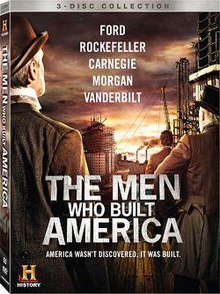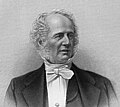The Ford Foundation is an American private foundation with the stated goal of advancing human welfare. Created in 1936 by Edsel Ford and his father Henry Ford, it was originally funded by a US$25,000 gift from Edsel Ford. By 1947, after the death of the two founders, the foundation owned 90% of the non-voting shares of the Ford Motor Company. Between 1955 and 1974, the foundation sold its Ford Motor Company holdings and now plays no role in the automobile company.
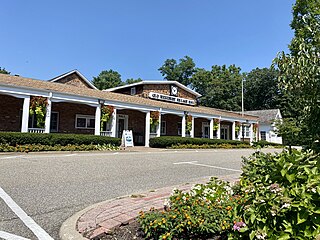
Old Westbury is a village in the Town of North Hempstead and Oyster Bay in Nassau County, on the North Shore of Long Island, in New York, United States. The population was 4,671 at the 2010 census.

Cornelius Vanderbilt, nicknamed "the Commodore", was an American business magnate who built his wealth in railroads and shipping. After working with his father's business, Vanderbilt worked his way into leadership positions in the inland water trade and invested in the rapidly growing railroad industry, effectively transforming the geography of the United States.

The Vanderbilt family is an American family who gained prominence during the Gilded Age. Their success began with the shipping and railroad empires of Cornelius Vanderbilt, and the family expanded into various other areas of industry and philanthropy. Cornelius Vanderbilt's descendants went on to build grand mansions on Fifth Avenue in New York City; luxurious "summer cottages" in Newport, Rhode Island; the palatial Biltmore House in Asheville, North Carolina; and various other opulent homes. The family also built Berkshire cottages in the western region of Massachusetts; examples include Elm Court.
A business magnate, also known as an industrialist or tycoon, is a person who has achieved immense wealth through the creation or ownership of multiple lines of enterprise. The term characteristically refers to a powerful entrepreneur and investor who controls, through personal enterprise ownership or a dominant shareholding position, a firm or industry whose goods or services are widely consumed. Such individuals have been known by different terms throughout history, such as robber barons, captains of industry, moguls, oligarchs, plutocrats, or tai-pans.
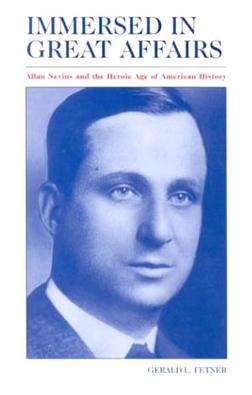
Joseph Allan Nevins was an American historian and journalist, known for his extensive work on the history of the Civil War and his biographies of such figures as Grover Cleveland, Hamilton Fish, Henry Ford, and John D. Rockefeller, as well as his public service. He was a leading exponent of business history and oral history.

Robber baron is a term of social criticism originally applied to certain wealthy and powerful 19th-century American businessmen. The term appeared as early as the August 1870 issue of The Atlantic Monthly magazine. By the late 19th century, the term was typically applied to businessmen who used exploitative practices to amass their wealth. Those practices included exerting control over natural resources, influencing high levels of government, paying subsistence wages, squashing competition by acquiring their competitors to create monopolies and raise prices, and schemes to sell stock at inflated prices to unsuspecting investors. The term combines the sense of criminal ("robber") and illegitimate aristocracy.
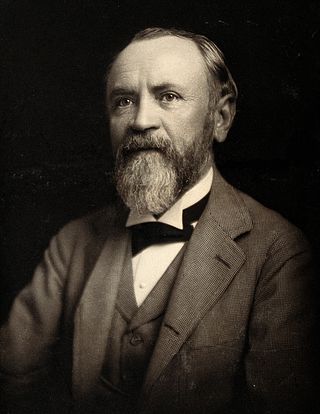
Henry Phipps Jr. was an American entrepreneur known for his business relationship with Andrew Carnegie and involvement with the Carnegie Steel Company. He was also a successful real estate investor. After selling his stock in Carnegie Steel, he devoted a great deal of his time and money to philanthropic works.

The Knickerbocker Club is a gentlemen's club in New York City that was founded in 1871. It is considered to be the most exclusive club in the United States and one of the most aristocratic gentlemen's clubs in the world.

Around the World in 80 Days is a three-part television miniseries originally broadcast on NBC from April 16 to 18, 1989. The production garnered three nominations for Emmy awards that year. The teleplay by John Gay is based on the 1873 Jules Verne novel of the same title.

America: The Story of Us is a 12-part, 9-hour documentary-drama television miniseries that premiered on April 25, 2010, on History. Produced by Nutopia, the program portrays more than 400 years of American history. It spans time from the successful English settlement of Jamestown beginning in 1607, through to the present day. Narrated by Liev Schreiber, the series recreates many historical events by using actors dressed in the style of the period and computer-generated special effects. The miniseries received mixed reviews by critics; but it attracted the largest audiences of any special aired by the channel to date.

Titanic: Blood and Steel is a 12-part television costume drama series about the construction of the RMS Titanic. Produced by History Asia, it is one of two large budget television dramas aired in April 2012, the centenary of the disaster; the other is Titanic.

Hatfields & McCoys is a 2012 American three-part Western television miniseries based on the Hatfield–McCoy feud produced by History channel. The two-hour episodes aired on May 28, 29, and 30, 2012.

Coma is a 2012 American television miniseries based on the 1977 novel Coma by Robin Cook and the subsequent 1978 film Coma. The four-hour medical thriller was originally broadcast on A&E on September 3–4, 2012.
The World Wars is a three-part, six-hour event miniseries by the History Channel that premiered on Monday, May 26, 2014, airing for three consecutive nights. An extended version of the series, divided into six episodes with never before seen footage, was subsequently broadcast on H2 and in more than 160 countries on June 22, 2014.
The Men Who Built America: Frontiersmen is a six-hour, four-part miniseries docudrama which premiered on March 7, 2018 on the History Channel. It is a complement to the 2012 docudrama The Men Who Built America. The series follows the lives of Daniel Boone, Lewis and Clark, Davy Crockett, Andrew Jackson, and others who blazed new trails across America's wilderness. The series is narrated by Campbell Scott, directed by John Ealer and executive produced by Leonardo DiCaprio.

Mellon: An American Life is a biographical book detailing the life Andrew Mellon (1855–1937), American banker, businessman, and philanthropist. Written by Sir David Cannadine, Dodge Professor of History at Princeton University, the book describes how Mellon built his personal wealth by investing and running businesses in major industries, eventually becoming the Secretary of the Treasury under Presidents Warren Harding, Calvin Coolidge, and Herbert Hoover. He was also noted for founding the National Gallery of Art in Washington, D.C. Cannadine acknowledges the controversy that surrounds Mellon and the other industrialists of his era. Like John D. Rockefeller Jr., Henry Clay Frick, Andrew Carnegie, John Pierpont Morgan Sr., and William Randolph Hearst, the businessmen were part of a fundamental transformation of the American economy in the late-nineteenth and early-twentieth centuries.

The Titans That Built America is a six-hour, three-part miniseries docudrama which was originally broadcast on the History Channel on May 31, 2021. The series focuses on the lives of Pierre S. du Pont, Walter Chrysler, JP Morgan Jr., William Boeing, Henry Kaiser, Charles Lindbergh, William S. Kundsen, John Raskob, Edsel Ford, and Henry Ford. It serves as a sequel to The Men Who Built America.
